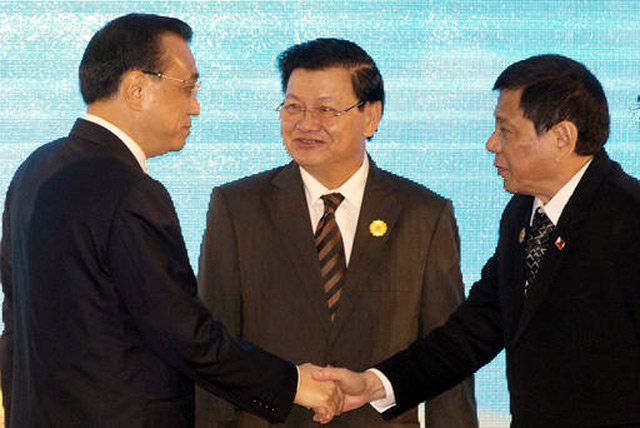Investment bonanza for China

Chinese Premier Li Keqiang, left, shakes hands with Philippine’s President Rodrigo Duterte, right, as Laos’ Prime Minister Thongloun Sisoulith, watches during the 19th Asean-China summit, in Vientiane, Laos, Wednesday, Sept. 7, 2016. AP FILE PHOTO
Even before his state visit to China this week, President Duterte’s rhetoric-laden speeches have already signaled a shift towards that direction where a slew of business opportunities await.
Some of the largest potential deals here involved railways and even broadband internet, areas that the President said needed rapid improvement. But specific details of the planned investments have been scant so far.
Given the size of projects involved—the Department of Transportation (DOTr) alone has a P1-trillion pipeline of train projects—it could be nothing short of an investment bonanza for Chinese companies.
A deal on railways was already expected, given statements from government officials pointing to a possible agreement, officials said.
Socioeconomic planning secretary Ernesto Pernia already said last week that China could be tapped for rail projects in Clark and Mindanao.
Separately last week, Subic Bay Metropolitan Authority chair Martin Diño said an unnamed Chinese company would build the country’s first “bullet train” linking Clark in Pampanga to Subic in Zambales.
There has been limited discussion about a Subic to Clark railway line by the transportation ministry, however.
Transportation secretary Arthur Tugade had so far only revealed plans for a cargo railway line linking both areas. He said the rationale was to connect Subic’s seaport with Clark’s international airport.
Bullet train?
More visible among the DOTr’s plans was the Clark to Manila railway line. This was mainly to convince passengers to fly out of Clark International Airport, instead of Manila’s Ninoy Aquino International Airport, already congested and operating beyond its capacity.
What was not detailed was whether the Clark-Manila train line would be a bullet train. According to the International Union of Railways, high-speed trains could run at speeds above 250 kilometers per hour, using the European Union’s standards.
They are also expensive.
Dr. Shizuo Iwata, who helped the Japan International Cooperation Agency craft a P2.6-trillion plan to decongest Metro Manila until 2030, previously said a bullet train project was not yet feasible.
Pernia also mentioned a railway line in Mindanao. Again, there were limited details. A letter sent by the DOTr to the office of Sen. Grace Poe showed a railway line in Mindanao spanning “20 kilometers.” It had an estimated project cost of P79 billion.
Cherie Mercado, DOTr spokesperson, said a partnership with China for trains was a possibility.
“We will have to wait for the China visit to get a clearer direction,” she said.
So far, China’s biggest train maker, CRRC Dalian, said it wanted a larger exposure in the Philippines, committing to build even a train assembly plant.
It said the assembly plant would produce train coaches, including subway cars and diesel multiple unit fleets. CRRC Dalian is part of the same group that won a 2014 bid to supply 48 new train coaches to the congested Metro Rail Transit Line 3 in Metro Manila.
Broadband internet was another area where Mr. Duterte said the Philippines and China could cooperate. Referring to the state of telecommunications services in the country, the President threatened to allow Chinese telcos to enter the Philippines.
The Philippines is mainly served by two telecommunications players, PLDT Inc. and Globe Telecom. Their respective foreign partners are Japan’s NTT Group and Singapore Telecommunications Ltd.
Nat’l broadband network
Another major project the Philippines is eyeing is a national broadband network, which would provide high-speed internet access to areas in the countryside the commercial telcos cannot, or refuse to serve, due to business viability issues.
Department of Information and Communications Technology secretary Rodolfo Salalima said last week they were keen on pursing a national broadband plan. Citing third-party estimates, he said this could cost anywhere from P77 billion to almost P200 billion.
He said they were still studying its implementation, including possibility lowering that capital spending figure.
Chinese technology giant ZTE was involved in the country’s last attempt to build a national broadband network. However, the $329 million (P16 billion) project was ultimately scrapped due to corruption issues during the Arroyo administration.
Meeting with Xi Jinping
Presidential spokesperson Ernesto Abella said Saturday President Duterte was expected to meet with his Chinese counterpart, Xi Jinping, in his state visit from Oct. 18 t0 21. A number of agreements “in various fields of cooperation between the two countries” are also set to be signed.
“We expect a good result for our country and it will bring in an economic increase,” Abella said. “So we are awaiting the results of our talks with China. And the news is that many businessmen from the Philippines will also go.”
“So we are expecting a good result for us. It will bring greater cooperation,” he said, adding that the president was also scheduled to meet with other Chinese leaders, including Premier Li Keqiang.
RELATED STORIES
Duterte optimistic on state visit to China, trade deals
